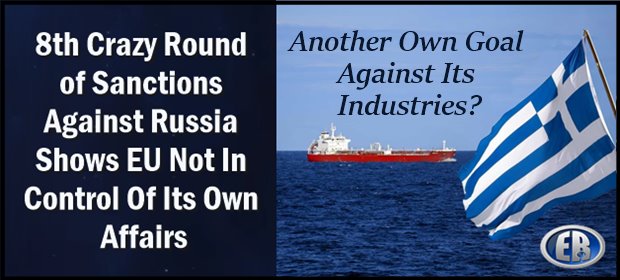
ER Editor: The Zerohedge piece below tells us about the ridiculous idea, of somehow obliging third party countries such as China and India not to buy Russian gas if the price is higher than what the EU approves. Duh.
Here is Moon of Alabama to comment on it. He begins by describing the stupidity of the 7 rounds of sanctions to date:
A sane actor would conclude that the sanctions were a mistake and that lifting them would help Europe more than it would help Russia. But no, the U.S. and European pseudo elites are no longer able to act in a sane manner. They are instead doubling down with the most crazy sanction scheme one has ever heard of:
[T]he European Union pushed ahead on Wednesday with an ambitious but untested plan to limit Russia’s oil revenue.
…
If the global price of oil remains high, it would complicate the European Union’s effort to impose a price cap on Russian oil that was expected to gain final approval on Thursday, after E.U. negotiators reached an agreement on the measure as part of a fresh package of sanctions against Moscow. Under the plan, a committee including representatives of the European Union, the Group of 7 nations and others that agree to the price cap would meet regularly to decide on the price at which Russian oil should be sold, and that it would change based on the market price.Several diplomats involved in the E.U. talks said that Greece, Malta and Cyprus — maritime nations that would be most affected by the price cap — received assurances that their business interests would be preserved, the diplomats said.
The countries had been holding up what would be the eighth sanctions package the European Union has adopted since the Russian invasion of Ukraine because of worries that a price cap on Russian oil exported outside the bloc would affect their shipping, insurance and other industries, the diplomats said.
With oil prices at a high, Russia is raking in billions of dollars in revenue, even as it sells smaller quantities. The cap — part of a broad plan pushed by the Biden administration that the G7 agreed to last month — is intended to set the price of Russian oil lower than where it is today, but still above cost. The U.S. Treasury calculates that the cap would deprive the Kremlin of tens of billions of dollars annually.
How do you make a big producer of a rare commodity sell those goods below the general market price? Unless you have a very strong buyers cartel that can also that product from elsewhere, you cannot do this successfully. It is an economic impossibility.
To make the measure effective, and cut Russian revenue, the United States, Europe and their allies would need to convince India and China, which buy substantial quantities of Russian oil, to purchase it only at the agreed upon price. Experts say that even with willing partners, the cap could be hard to implement.
Russia has declared that it will not sell any oil to any party that supports the G7 price fixing regime. That is why neither China nor India nor any other country besides the EU and U.S. will agree to adhere to it.
The whole idea is crazy and way too complicated to achieve anything:
Under the new rules, companies involved in the shipping of Russian oil — including shipowners, insurers and underwriters — would be on the hook for ensuring that the oil they are helping to transport is being sold at or below the price cap. If they are caught helping Russia sell at a higher price, they could face lawsuits in their home countries for violating sanctions. Russian crude will come under an embargo in most of the European Union on Dec. 5, and petroleum products will follow in February. The price cap on shipments to non-E.U. countries has been championed by U.S. Treasury Secretary Janet Yellen as a necessary complement to the European oil embargo.
Under the E.U. deal, Greece, Malta and Cyprus will be permitted to continue shipping Russian oil. Had they not agreed to place their companies at the forefront of applying the price cap, they would have been forbidden from shipping or insuring Russian oil cargo outside the European Union, a huge hit for major industries.
More than half of the tankers now shipping Russia’s oil are Greek-owned. And the financial services that underpin that trade — including insurance, reinsurance and letters of credit — are overwhelmingly based in the European Union and Britain.
This is of course an open invitation to other countries to enter the oil shipping and related financial services businesses at the cost of European companies.
China and India will both it [sic] to increase their market shares in those fields. Their ships will transport Russian oil to whoever wants to buy it for the market price minus the always negotiable Russian rebate. Greek ships will sit idle or will be sold off while Indian and Chinese and other Asian tankers will be very, very busy. China’s big insurance companies will happily join that new global services business.
That European bureaucrats agreed to his stupid U.S. idea, which will foremost hurt European businesses, is another sign that Brussels has given up on having any agency. …
***
From the Greek City Times, readers may be interested in this piece from May of this year:
Greece still the world’s leading shipping country with 21% of the world’s fleet
********
EU Ambassadors Agree On A Russian Oil Price Cap
By Tsvetana Paraskova of OilPrice.com
European Union ambassadors reached an agreement on Wednesday to impose a new package of sanctions on Russia, including banning maritime transportation for Russian oil to third-party countries unless the oil is sold below or at a certain price cap.
“Ambassadors reached a political agreement on new sanctions against Russia – a strong EU response to Putin’s illegal annexation of Ukrainian territories,” the Czech rotating presidency of the EU said in a tweet today.
A written procedure now follows, and sanctions enter into force upon publication in the Official Journal, the Czech Presidency said.
The eighth package of sanctions includes “Prohibition of maritime transport of Russian oil to third countries above the oil price cap and a ban on related services.” The additional sanctions also extend import bans on goods such as steel products, wood pulp, paper, machinery and appliances, chemicals, plastic, and cigarettes. The EU is also banning the provision of IT, engineering, and legal services to Russian entities and is expanding the tech-export ban.
The political agreement on the price cap contains measures to soften the impact of the sanctions on EU member states with large shipping industries and fleets, such as Greece, Cyprus, and Malta, sources with knowledge of the matter told Bloomberg.
A sanctions package would need unanimous approval by all 27 EU member states, but Hungary has said it would block new energy sanctions against Russia. (ER: Which is why EU elites are pushing so hard for majority voting.)
EU leaders are set to discuss Russia’s war in Ukraine, energy, and the economic situation at a meeting in Prague on October 7.
Earlier this week, Ben Harris, Assistant Secretary for Economic Policy at the U.S. Treasury Department, said that the Treasury is looking to structure a three-phased approach to the G7 sanctions and price caps on Russian oil to keep Russian crude and products flowing, but at lower prices. The G7 group of the most industrialized nations will first target Russia’s crude oil, then move on to include diesel at a second stage. Finally, the lower-value products such as naphtha will be part of a third phase, Harris said at the Argus European Crude Conference in Geneva on Tuesday.
************
Source
Featured image source: https://greekcitytimes.com/2022/05/20/greece-leading-shipping-country/

••••
The Liberty Beacon Project is now expanding at a near exponential rate, and for this we are grateful and excited! But we must also be practical. For 7 years we have not asked for any donations, and have built this project with our own funds as we grew. We are now experiencing ever increasing growing pains due to the large number of websites and projects we represent. So we have just installed donation buttons on our websites and ask that you consider this when you visit them. Nothing is too small. We thank you for all your support and your considerations … (TLB)
••••
Comment Policy: As a privately owned web site, we reserve the right to remove comments that contain spam, advertising, vulgarity, threats of violence, racism, or personal/abusive attacks on other users. This also applies to trolling, the use of more than one alias, or just intentional mischief. Enforcement of this policy is at the discretion of this websites administrators. Repeat offenders may be blocked or permanently banned without prior warning.
••••
Disclaimer: TLB websites contain copyrighted material the use of which has not always been specifically authorized by the copyright owner. We are making such material available to our readers under the provisions of “fair use” in an effort to advance a better understanding of political, health, economic and social issues. The material on this site is distributed without profit to those who have expressed a prior interest in receiving it for research and educational purposes. If you wish to use copyrighted material for purposes other than “fair use” you must request permission from the copyright owner.
••••
Disclaimer: The information and opinions shared are for informational purposes only including, but not limited to, text, graphics, images and other material are not intended as medical advice or instruction. Nothing mentioned is intended to be a substitute for professional medical advice, diagnosis or treatment.






Leave a Reply